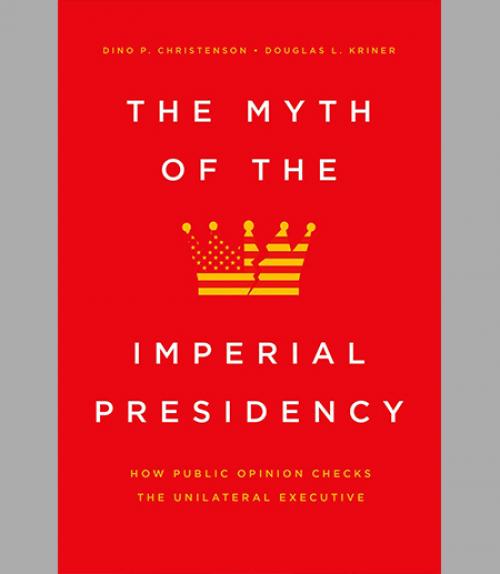After Bill Clinton promised during the 1992 presidential campaign to end a ban on gays serving in the military, his new administration readied an executive order to implement the policy.
Clinton never signed it. Facing strong opposition from Republicans and some moderate Democrats in Congress, the president settled for a compromise known as “Don’t ask, don’t tell.”
The case illustrates the critical but widely overlooked role that public opinion plays in constraining presidents’ ability to act unilaterally, according to Douglas Kriner, the Clinton Rossiter Professor in American Institutions in the College of Arts and Sciences.
“There are many policies that presidents could change unilaterally but don’t, because they’re worried about blowback from public opinion, the cost that entails and, ultimately, the cost to them and their party at the ballot box,” Kriner said.
Kriner is the co-author with Dino P. Christenson, associate professor of political science at Boston University, of “The Myth of the Imperial Presidency: How Public Opinion Checks the Unilateral Executive,” which was published in July.
Politicians, scholars and pundits have warned about the rise of an “imperial presidency” since historian Arthur Schlesinger Jr. coined the term in a 1973 book. Schlesinger sounded the alarm about presidents applying exceptional wartime executive authority to the domestic sphere, threatening constitutional checks and balances.
That narrative regained strength as Presidents George W. Bush and Barack Obama used executive actions to claim broad powers to fight terrorism after 9/11. More recently, President Donald J. Trump in 2019 declared a national emergency to advance construction of a border wall that Congress had refused to fund.
The latter instance prompted a rare rebuke from both chambers of Congress, which passed legislation rescinding the declaration. But lacking two-thirds majorities, Trump simply vetoed the joint resolution.
“Legislative checks are fairly weak in terms of the ability to roll back what presidents have done,” Kriner said.
Given that reality, and the fact that court challenges may drag on for years, Kriner and Christenson ask, why don’t presidents succumb to the “siren song of unilateralism” more often?
Their analysis shows recent presidents have not, in fact, issued consequential executive orders, memoranda, proclamations or agreements at higher rates than their predecessors. Most executive actions have little effect on daily life and don’t merit news coverage, they write.
And through experiments using nationally representative opinion surveys, the scholars found that Americans don’t instinctively oppose presidents acting unilaterally, as is often presumed. Instead, partisanship and policy preferences drive their response – they support unilateral action by members of their own party, or when they agree with the policy being enacted.
The popular check is not automatic, Kriner and Christenson determined, but is activated and shaped by political elites. Criticism from members of Congress and the threat of legal challenges that may become the subject of intense media speculation can erode support for a unilateral action and damage a president’s approval rating.
“There are political costs if you go out and do something bold that provokes sustained and sharp resistance from other political elites,” Kriner said.
As a result, Kriner and Christenson concluded, presidents weighing whether to pursue a controversial executive action are primarily concerned with political calculations, not a Madisonian system of constitutional checks and balances. Will public opposition weaken support for their broader policy agenda or help the other party win the White House and, thus, endanger their legacy?
Trump is widely perceived as having exercised unilateral authority aggressively and “imperially,” but Kriner said most of his early executive orders simply undid actions Obama took. Trump is an outlier in one important way, however, Kriner said: He’s more willing to pursue unilateral action like the border wall to fire up his base, even if it is unpopular.
“Past presidents have tended to keep national public opinion in mind; you don’t want to go against the majority of Americans too often because the cost of doing so can be quite steep,” Kriner said. “That makes Trump different and, depending on your normative spin, potentially a little more dangerous.”
Even Trump, however, has backpedaled from numerous policies in the face of public backlash. He didn’t follow through on a campaign pledge to reinstitute torture of terror suspects, and in 2018 he issued an executive order reversing the administration’s policy of family separations at the border.
Those and many other case studies reveal, Kriner and Christenson wrote, that “the imperial presidency is chimerical.”
“This trope continues to be rolled out there that presidents wield almost imperial power,” Kriner said. “I think that overlooks very important political constraints and the empirical reality of how presidents have used this unilateral authority over the last 50-plus years.”




